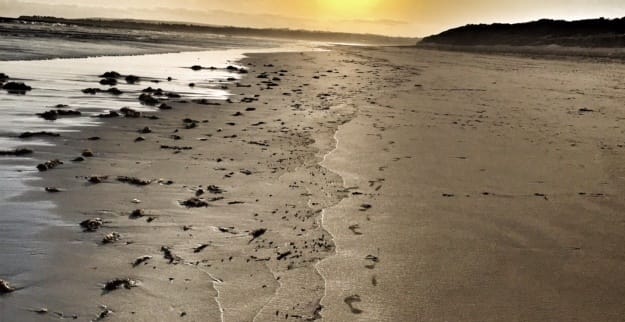
Over the last year, our Writeability Goes Regional project has included a remit to uncover and showcase the work of some of Victoria’s regional writers with disability.
Enjoy this extract from ‘The line in the sand’ by regional writer Amber Airey…
There is a line drawn in the sand, between the able bodied community and the disabled community. Whether people wish to acknowledge it, it is there, you only need to turn to social media where the debate some days runs hot. What is becoming very clear from these online debates is that the disabled community are fed up. Done with being spoken for, spoken about and generally told what they are able to do or not do. For the lack of recognition received, and the unequal standards we are expected to accept.
In a world where people believe they have a right to tell you what you can and cannot do, the need to prove yourself becomes strong and at times consuming. Having experienced my fair share of judgement passed off as good intentions since my own diagnosis of Multiple Sclerosis, I know all too well how it feels to be told that I don’t know what’s best for me, purely because I have a disability. My life did not begin when I was diagnosed. Actually I had lived 32 years of life prior to becoming chronically ill. ‘Though from what I experienced post diagnosis, it would seem that all of that experience became null and void the moment I received those fateful words from my neurologist.
Suddenly I was thrust into a world where those around me felt it was their job to tell me how to live with my illness. As if somehow they would know better than I would. Me, the person actually living in the body with the disease. Somewhere in their able bodied minds, I was the least knowledgeable on what I could or couldn’t do now. This advice came from all quarters and it covered everything from how I should process my diagnosis emotionally, to the commentators from behind their screens who took on the job of explaining my condition to me even after I had been living with it for 6 years. Oh and who could forget being told I was unemployable because I was no longer able to work! Yes, I have heard it all, and the discouragers definitely outnumber the encouragers.
If I was to take on these opinions as my own, I would be accepting that this is all there was for me now. Life over! Nothing more for me, but to give up and and give in. I chose not to embrace these opinions and just as my life didn’t begin when I was diagnosed, it certainly didn’t end either. I am still breathing, my heart still beating. I am just as alive today as I was before I was diagnosed, actually I am more alive today than ever before. My disability has afforded me the clarity to see what the important things in my life are. My dreams and aspirations are just as strong as before. It is why I surround and affiliate myself with those from the abled and disabled community who see beyond the line in the sand. The ones who don’t see my disability and instead see the person I still am.
Society is conditioned to fear anything that is perceived as different. Fear comes from ignorance. A lack of understanding for anything that doesn’t fit within our norms. It is this ignorance and fear that leads to discrimination. There are those who wish to learn more, and be educated, though it is the ones that have no interest in learning and chose their ignorance that do most harm. When faced with discrimination disable people have to fight to prove their value beyond reproach to the world. It is also this same discrimination that has disabled people shying away from society, hiding their illnesses, or just disengaging all together.
Discrimination breeds further fear. I know within the Multiple Sclerosis community many people living with this disease who have chosen to hide it for as long as they can. They live with the burden of not disclosing. Unable to talk openly about their life with honesty, because they fear the consequences. The consequences are all too real. Loss of employment, friends and even family. Becoming devalued the moment you disclose your illness, and disability. It creates anxiety, depression and constant internal debate of who you can and can’t tell. So not only are you learning to accept your diagnosis, or disability, you are also learning that you are now seen as different, unacceptable and disregarded as someone, only worthy of other people’s pity.
Beyond the diversity, the disability, illness and difference we just want to be seen as the people we are. Striving to live the best we can. Achieving our dreams. Living a full life, just like anyone else. These things are only possible with support, acceptance, opportunity and open doors. Where instead of being judge for our difference we are embraced for all that our differences bring to the world. Isn’t this what everybody wants? Isn’t that what everybody deserves?
About Amber Airey
Amber is a regional Writers Victoria member and an emerging writer who has previously written for MS Australia’s Uninterrupted website and on her personal blog about life with a chronic illness and disability. She is a strong advocate for developing and supporting programs that encourages people living with disability to share their stories.
Credits
This commission is supported by Perpetual Trustees.
© Amber Airey 2016
